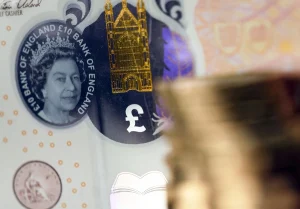British Pound Sterling Tumbles as UK Bond Yields Hit Highest Since 1998
The British government is under pressure to win back investor confidence

Quick overview
- The UK government faces pressure to regain investor confidence as 30-year bond yields hit their highest since 1998 and the pound falls below $1.34.
- Foreign investors now hold a third of UK gilts, a significant increase from 19% in the late 1990s, making the market more vulnerable to volatility.
- Tax increases are seen as necessary despite potential negative impacts on inflation and the economy, with calls for credible fiscal announcements to reassure markets.
- Experts warn that the rise in gilt yields may force the Bank of England to halt interest rate cuts, emphasizing the need for clear communication on fiscal policies.
The British government is under pressure to win back investor confidence as UK 30-year bond yields reach their highest level since 1998 and the pound falls below $1.34.

The pound fell more than 1 percent, trailing all other major currencies, and 30-year gilt yields jumped 5 basis points to 5¢69 percent. The FTSE 100 Index fell 0.5 percentage points. Ahead of her autumn budget, Chancellor of the Exchequer Rachel Reeves faces a precarious fiscal environment that could be made worse by rising debt costs. The UK has the highest benchmark 10-year yield among the Group of Seven countries.
Historically, gilts have been regarded as a safe-haven investment, attracting steady buyers like pension funds. Since hedge funds and foreign investors have seized UK government bonds, the situation has shifted, making them more vulnerable to market Volatility.
Foreign investors held a third of Gilts in 2023–2024, up from 19 percent in the late 1990s, according to a recent OBR report.
The fiscal watchdog reports that their share of gilt holdings has decreased from about two-thirds to less than one-third, as for the pensions and insurance sector. In addition, although the Bank of England’s share has increased, quantitative tightening caused it to begin declining during the last two years.
Tax increases are viewed as unavoidable, despite being politically challenging and possibly detrimental to inflation and the economy.
The market must view the announcements as credible. Anxiety in bond markets won’t be reduced if Reeves’ final announcement is perceived as kicking the can down the road and tweaking the edges rather than addressing the fundamental problems.
More drastic actions would require a level of skill and agility that hasn’t been present up to this point. If not, the UK may find itself in a similar situation, with investors doubting the government’s plans to address the issue more sustainably and, more importantly, whether they can actually carry them out, even if the plans they develop appear to be sound.
Ludovic Subran, Chief Economist at Allianz, told Bloomberg TV that the increase in gilt yields will force the Bank of England to cease lowering interest rates. He said that even though interest rates haven’t hit their terminal rate, the increase gives the BOE “a big wall” and that it will need to “communicate well the long pause that is about to come.”.
He continued by saying that “forward guidance on the fiscal side will be needed, “with Rachel Reeves assuring markets that the budget black hole can be avoided.
- Check out our free forex signals
- Follow the top economic events on FX Leaders economic calendar
- Trade better, discover more Forex Trading Strategies
- Open a FREE Trading Account
- Read our latest reviews on: Avatrade, Exness, HFM and XM


